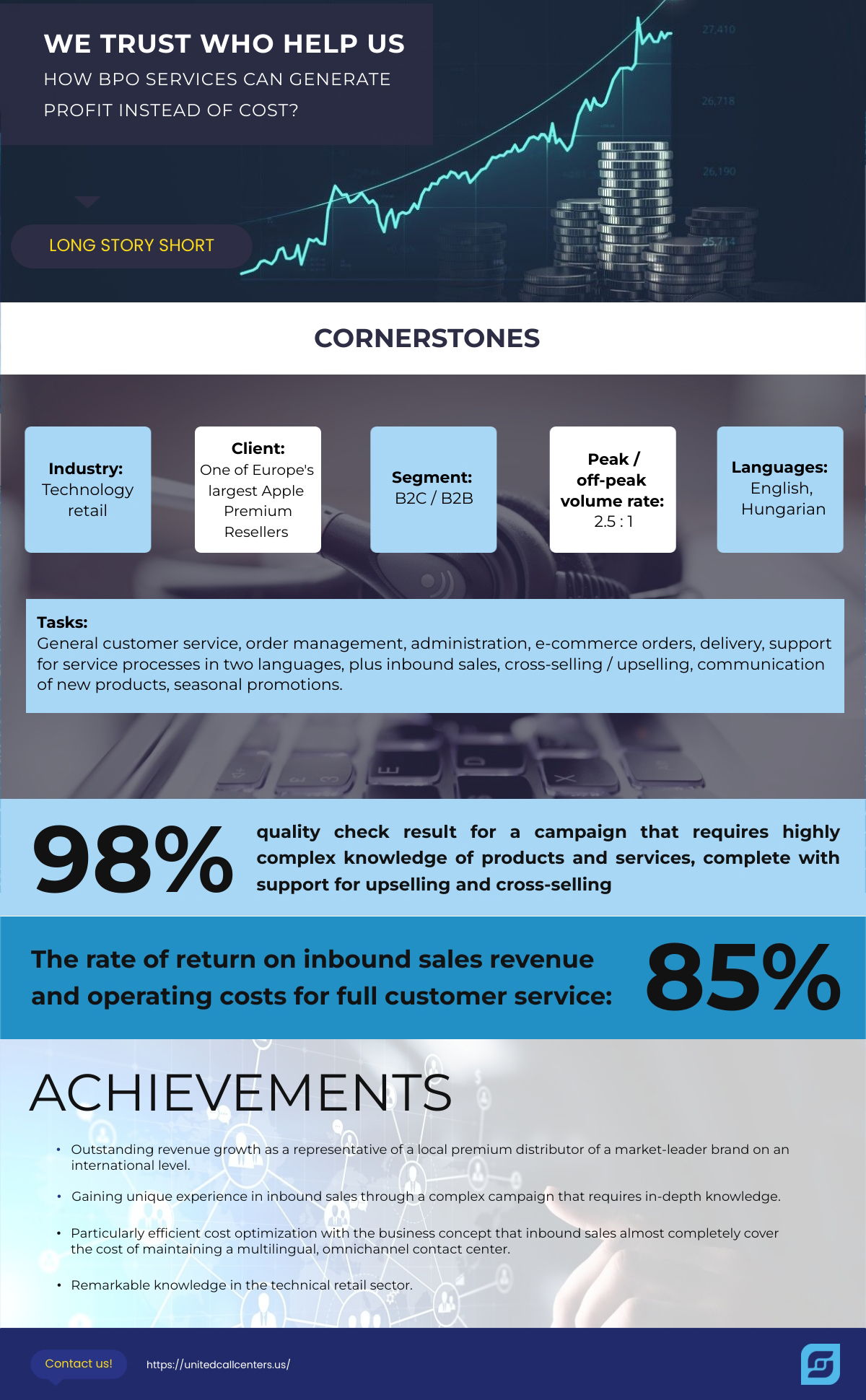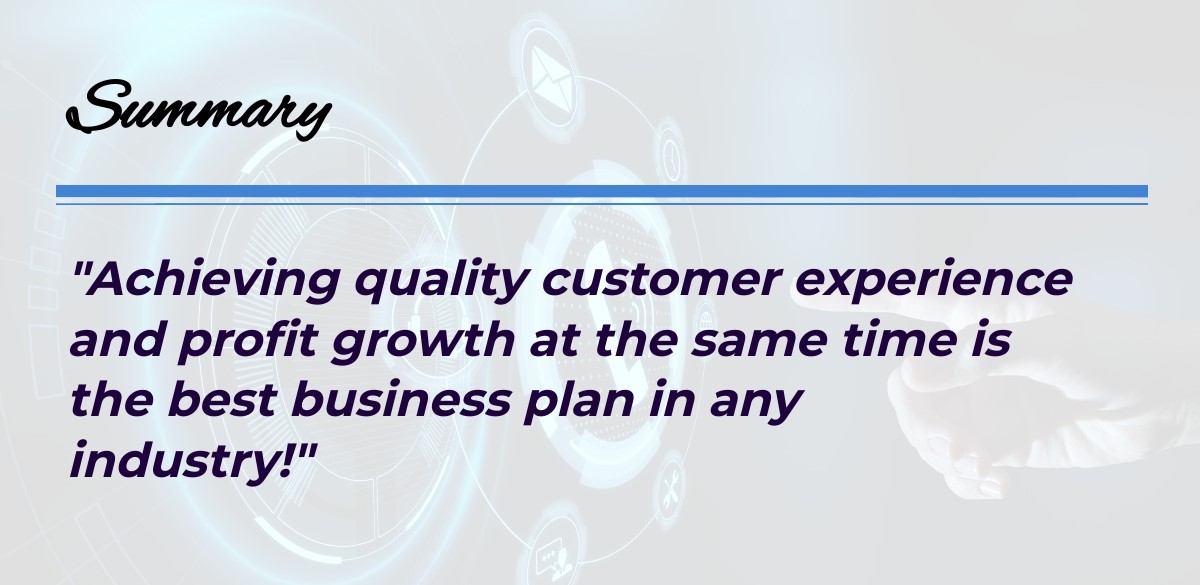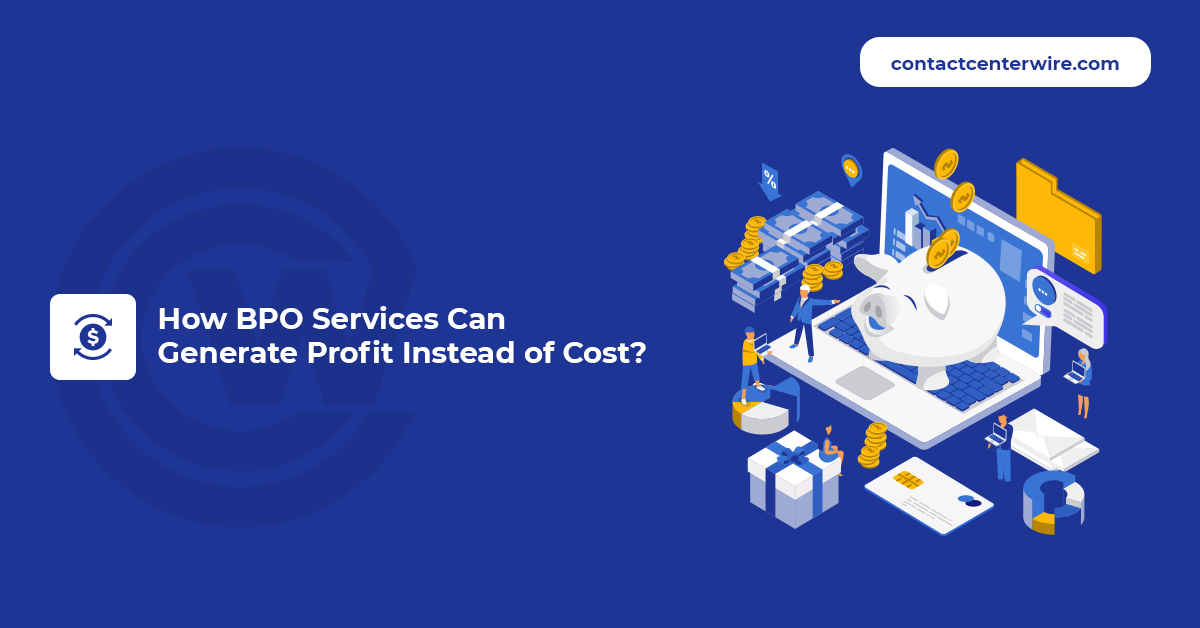When we say we live in a rapidly changing world, we have said nothing new. In a period of sequential crises and negative market trends, every business is looking for ways to optimize costs and save money. How can outsourced customer service be an effective tool to do this? How can customer support generate enough revenue to cover the cost of employing a contact center, even on a one-to-one basis? In our case study, we provide some answers to these questions.
The not-so-secret weapon
The best way to optimize our costs is to sell more. Inbound sales is an excellent tool to increase sales. From the perspective of a BPO contact center, this sales methodology is based on two simple laws.
- The customer contacts us because they need help, so we no longer need to generate interest
- A quality customer experience keeps the customer satisfied, so the necessary trust is established during the contact
But let's put this as simply as possible! We trust the people who help us.
Increasing profits instead of costs
Quality customer service is now a fundamental principle for all major companies and brands, as direct contact, whether by phone, email, chat, whatever the sector, language or dialect, is a key factor in the customer experience. Even today, clients often put this area and the associated tasks in the cost column, when the situation is much more nuanced. As our expert said:
"For companies worldwide, customer service equals cost, which is understandable in a way. You have to pay for the people, the software, the up-to-date technology infrastructure, and of course the associated training and management that runs the call center team. If you want to have a team of professionals with the right skills, the right attitude, and the ability to cover multiple language areas, it often requires a significant investment."
Outsourcing customer service is a cost-cutting measure in itself, as many internationally dominant contact center companies work in a hybrid, decentralized model, making the best professionals available from any language area in a matter of days. And if a contact center is able to actually extract its own costs by integrating new sales channels while performing its tasks, that is the best possible scenario.
The synergy between customer service and sales
A contact center with a good sales vein creates endless opportunities to increase profits. A general customer service department can perform sales tasks at any time, and vice versa. When a customer contacts us, which in the BPO sector can be through any channel or in any language, they are the initiator who want to get their questions answered. Be it general information, inquiries about pending orders, new products or services.
The call center operator must be familiar with the product or service he is informing the customer about so that he can sell it. Of course, this is also true in reverse: if you know enough about a product to sell it, you can also answer any questions customers may have.
In fact, we can create opportunities to initiate up-selling or cross-selling activities whenever we see a receptiveness. The important players of the marketplace employ experienced operators with excellent soft skills, who are on call every minute of the day, and who know that the point of inbound sales is not to sell as fast as possible, but to guide the customers, understand the their needs and objectives, and to provide the right information at the right time.
Nice reasoning, but how does it work in practice?
Let's take a closer look at a collaboration that proves how an outsourced professional contact center can generate enough additional revenue to cover the costs of customer service tasks for the client - in other words, the customer service activity is in effect self-financing by integrating sales.

We will be briefed by United Call Centers staff on the details of the implementation and collaboration:
"The basic task was to create a classic inbound customer service. This included general customer information, order management, administration, and support for the service process, and we also handled the e-commerce orders. After the first 2-3 months from the launch of the service, the so-called hypercare period, we started to build the inbound sales activity.
In practice, this meant that if someone placed an order for a handset, or needed help with any other issue, we always tried to find out what else the customer might need, both to improve the flow of information between the operator and the customer and to generate significant additional revenue.
In practice, thanks to this business development, our partner was able to finance all (about 103%) of the customer service costs from the revenues generated by the added value created by the call center during the cooperation. All this while at the same time ensuring the best customer experience in customer service."
Where else does outsourcing generate revenue?
The question arises, can a team of in-house employees do the same? The answer is probably yes. Many do it in-house. However, there is a less tangible, but very important and widely recognized advantage of using BPO contact centers: cost-effectiveness, flexible services that can be tailored to your needs, and, in addition, less sensitivity to employee turnover.
This is because the time and energy spent on customer service tasks can be used almost entirely by the client to create value in their own field, focusing on areas and workflows where deep professional knowledge and personal presence are essential.
"Customer service and sales can also reinforce each other when we keep processes in-house. However, in addition to the higher costs, which do not necessarily reflect the actual contact volume, the business often loses focus because of the need to organize the team, train and manage the staff. And if specialized knowledge or language skills are required, the workload of call center staff is much greater if a routine colleague is unable to work, which can have a negative impact on the customer experience.
Once these processes are outsourced, it is much easier to focus on the core business of the company, on innovation, and on the creation of real value. Achieving quality customer experience and profit growth at the same time is the best business plan in any industry!"
But how do we know outsourcing your customer service is the right decision for your company specifically? Read our related publication!

To further expand your knowledge of customer service and contact centers, sign up for our newsletter to be the first to receive ContactCenterWire.com's professional articles and case studies!

